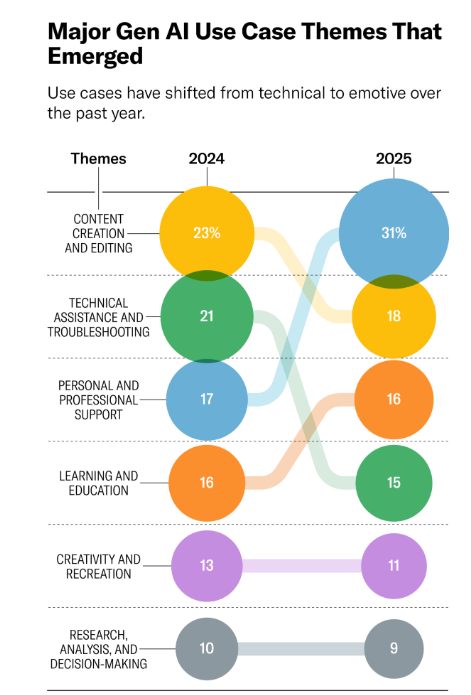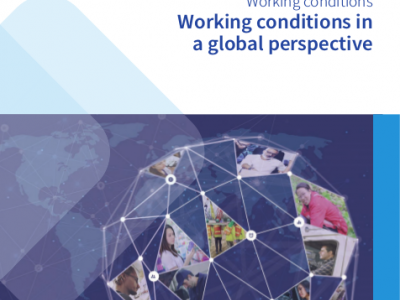How People Are Really Using Gen AI in 2025
How People Are Really Using Gen AI in 2025

Since then, the hype around AI, gen AI, and large language models (LLMs) has only amplified. User interest has doubled, investment in AI is skyrocketing, governments are taking more emphatic and explicit positions, and the stakes are about as high as they get—the future of humanity, according to some.
The HBR editors and I felt a need to update the research. Much has happened over the past 12 months. We now have custom GPTs: AI tailored for narrower sets of requirements. New kids are on the block, such as DeepSeek and Grok, providing more competition and choice. Millions of ears pricked up as Google debuted their podcast generator, NotebookLM. OpenAI launched many new models (now along with the promise to consolidate them all into one unified interface). Chain-of-thought reasoning, whereby AI sacrifices speed for depth and better answers by sharing the intermediate reasoning steps with the user before arriving at a final answer, came into play. Voice commands now enable more and different interactions, such as allowing us to use gen AI while driving. And costs have substantially reduced with access broadened over the past 12 hectic months.
The aspiration for this rebooted piece is exactly as it was a year ago. When people see others making effective, productive, advantage-yielding uses of a technology, they follow suit. Real-world use cases change behavior in ways and to an extent that PR, thought leadership, and technological brilliance simply cannot. So, by surfacing use cases from the depths of hundreds of subreddits, we hope to increase awareness and accelerate the many positive and beneficial applications of gen AI.
For this piece, I adopted the same methodology as last year but scoured more data (there was much more to scour) and limited the results to the past 12 months. I looked at online forums (Reddit, Quora), as well as articles that included explicit, specific applications of the technology. Perhaps owing to its inherent pseudonymity, Reddit again yielded the richest insights. I read through them myself, and added each relevant post to the tally for that category. Several days later, I emerged with the count and the quotes for each of the new 100 use cases.
The 2025 Top-100 Gen AI Use Case Report lists the top 100 applications now, in 2025, rated according to perceived usefulness and scale of impact (assessed qualitatively by expert review), and includes a quote or several for each. As before, this is where the real gold lies (but note that it’s produced in its raw, unedited form, and therefore not for the faint-hearted!). This time, I’ve steered harder to include quotes that are more explicitly and immediately useful.
Results and Trends
There are 38 new entries in the top 100 use cases. This reinforces what we know: that there is still so much change going on.
Therapy (more on this one later) is the new top use case. There are two other entrants in the top 5: “Organizing my life” and “Finding purpose.” These three uses reflect efforts toward self-actualization, marking a shift from technical to more emotive applications over the past year.
I organized the use cases into six broader themes, and found the following changes from 2024:

Source: Filtered.com
“Personal and Professional Support” is now the largest theme by far, stealing most of its new ground from “Technical Assistance & Troubleshooting.”
What Users Are Doing Now
Here are some use cases from the top 100 this year, along with a quote for each . I’ve picked out examples that offer particularly clear insights into how people are using the technology.
- Therapy/companionship (#1). “Where I’m from, in South Africa, mental healthcare barely exists; there’s a psychologist for 1 in every 100,000 people and a psychiatrist for 1 in every 300,000 people. Large language models are accessible to everyone, and they can help. Unfortunately, data safety is not a concern when your health is deteriorating, and survival is the morning agenda.”
- Organizing my life (#2). “I just asked it to create a timeline for me to clean and organize my house before we have guests staying.”
- Enhanced learning (#4). “I’ve been taking an online course to learn data analysis on my own and I use ChatGPT as a study guide to explain some stuff that the course kind of glosses over, which I then add to my notes. This helps me reinforce what I’m learning, and it’s been hella useful so far.”
- Healthier living (#10). “I just started trying a new eating plan, and calculating the macros with the spreadsheets of online ‘meal planners’ was making me crazy. Now I just ask for recipes based on my given macro needs per meal and take that list shopping. Then I use the air fryer and the rice maker—easy peasy.”
- Creating a travel itinerary (#24). “I asked ChatGPT for an extensive vacation itinerary with many details, such as rustic places to stay and to eat, key things to see, and hidden gems, while minimizing driving time. The output was perfect.”
- Disputing a fine (#83). “I received a Penalty Charge Notice (PCN) for entering a bus lane. The council were after £80 from me for what was about a 20-second stop, if that. I asked ChatGPT to write me an appeal and this morning got the letter saying the PCN has been voided. Thank you, AI, because I would have likely just paid the money if I had to type out a long, boring appeal letter myself.”
Purpose and Meaning
More and more of us are using LLMs to find purpose and improve ourselves.
Therapy and Companionship is now the #1 use case. This use case refers to two distinct but related use cases. Therapy involves structured support and guidance to process psychological challenges, while companionship encompasses ongoing social and emotional connection, sometimes with a romantic dimension. I grouped these together last year and this year because both fulfill a fundamental human need for emotional connection and support.
Many posters talked about how therapy with an AI model was helping them process grief or trauma. Three advantages to AI-based therapy came across clearly: It’s available 24/7, it’s relatively inexpensive (even free to use in some cases), and it comes without the prospect of judgment from another human being. The AI-as-therapy phenomenon has also been noticed in China. And although the debate about the full potential of computerized therapy is ongoing, recent research offers a reassuring perspective—that AI-delivered therapeutic interventions have reached a level of sophistication such that they’re indistinguishable from human-written therapeutic responses.
A growing number of professional services are now being partially delivered by generative AI—from therapy and medical advice to legal counsel, tax guidance, and software development. At EY, this transformation is already underway. As Simon Brown, EY’s Global Learning and Development Leader, explained to me, the organization is training employees in generative AI skills so that they’re able to work with a range of sector-specific agentic systems that support the professional services work of nearly 400,000 staff—including the deployment of 150 AI agents specifically being used for tax-related tasks.
The highest new entry in the use cases was “Organizing my life” at #2. These uses were mostly about people using the models to be more aware of their intentions (such as daily habits, New Year’s resolutions, and introspective insights) and find small, easy ways of getting started with them. People are doing this at home with privately purchased gen AI subscriptions (such as ChatGPT, Claude, and Perplexity) as well as at work (chiefly with Microsoft Copilot). Jared Spataro, Corporate Vice President of Modern Work and Business Applications at Microsoft, told me, “One of the most compelling AI scenarios is as a personal assistant at work. When connected to all your work data—emails, chats, files, and meetings—AI can free you from the drudgery of work and serve as an invaluable thought partner. It’s enabling employees to reclaim time, and be more productive and creative.”
The other big new entry is “Finding purpose” in third place. Determining and defining one’s values, getting past roadblocks, and taking steps to self-develop (e.g., advising on what you should do next, reframing a problem, helping you to stay focused) all now feature frequently under this banner.
There were other entries further down the list for which we see AI helping us with the softer side of being human. We’re using AI to boost our confidence (#18), to have deep and meaningful conversations (#29), and even to try to engage with the deceased (#33).
Most experts expected that AI would prove itself first and best in technical areas. While it’s doing plenty there, this research suggests that AI may help us as much or more with our innately human whims and desires.
Thinking for Ourselves
There was much disagreement and discord about whether the LLMs are a boon or bane for our own ability to think. One user admitted straightforwardly that they’d “grown too dependent” on AI. Another said, “I’m definitely becoming more reliant on it…Rather than use my brain for a complex task, I’m just turning to GPT.” On the other hand, the technology’s ability to enhance an individual’s learning and thinking was also acknowledged and celebrated: “If you do not use it as a learning tool then you will destroy your career progression and become stagnant and limited in your knowledge.”
This fear was manifested more explicitly on behalf of young people. Many people expressed concerns about the impact on college education (#23) in a world in which essays can be on-point, high-quality, and on-demand. Parents worry about the impact of gen AI on their younger children’s educational development (#41) as the LLMs can knock off many K-12 assignments in an instant.
But gen AI may also be helping here, enabling us to think more deeply, more clearly, and with less fear. Allie Miller, Fortune 500 AI Advisor, commented on the use cases:
Our best work comes when we have psychological safety, and why would that be any different working alongside AI? The lack of judgement and unrestricted exploration makes it an ideal playground for big dreams, potentially embarrassing questions, or hazy, half-formed goals. It’s more the prophecy that these use cases represent: a future in which the cost of going from the seed of an idea—whether it’s a new website or a personal life transformation—to a valuable action drops to near zero.
More Sophisticated Users
There were several indications that gen AI users in 2025 have now developed a deeper understanding along with a skepticism about gen AI, its creators, and the ecosystem it’s in.
The hottest cynical take is about the perceived political correctness of the LLMs. This may have been more pronounced over the course of the 2024 election year in the U.S. Gen AI lost at least this user as a result: “I cancelled my subscription for this reason. I do not want to support a tool that tries to turn the world more timid and prim.”
Data privacy came up repeatedly, too. Enthusiasm for gen AI was frequently met with warnings about what Big Tech would do with the data it’s harvesting. To this there was a chorus of protest, encapsulated by this quintessentially Reddit put-down:
Too late: my bank has it, my credit cards have it, Google has it, Bing has it, T-Mobile has it, my dentist and doctor have it…take a deep breath = texts, emails, voicemails, apps, photos, videos, location history, browsing history, saved passwords, contacts, calendars, social media accounts, reminders, shopping lists, payment methods, loyalty cards, step counts, sleep data, screen time stats, streaming preferences, even my food orders have my personal information.
Ironically, another common complaint was that the LLMs don’t know enough about their users, i.e., that they don’t retain sufficient memory: “I find it insane to impose such stringent memory storage restrictions.”
As one might expect, users seemed to have a better understanding of how LLMs work this year. More seem to understand the fundamental point that for AI to be useful to humans, we need to be clear about our intentions: “Of course it’s only helpful when I already know what I want to do.” And the prompts cited were much better (often with explicit support from the LLMs to create them), as you will see in the many examples listed out in the full report.
All that said, online public forums are also just the place for unnuanced, polarized opinions. Gen AI is described as “the most AMAZING invention and I can’t believe there are people who don’t use it.” Yet it’s also deemed utterly useless: “I can’t think of anything good this technology can bring.” Or worse: “I can’t even think of a single use case that isn’t malicious.”
What Next?
Online forums have always been fertile ground for idle speculation.
Most predictions anticipated either an extremely bad or extremely good end-state. One common and more nuanced forecast was the desire to see LLMs move from advice and information to doing, i.e., agentic behavior. For example, one user wanted a model that would “cancel this subscription before they start charging me.”
Last year, I made the correct but rather insipidly safe prediction that AI will continue to develop, as will our applications of it. I make exactly the same prediction now. See you in 2026.








